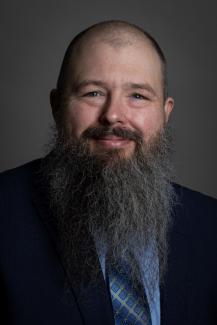During his two decades at NETL, William Fincham, a federal project manager, has developed a passion for technology development. His most recent efforts have included working to utilize technologies developed at the Lab to help support a changing energy future.
Fincham grew up in Farmington, West Virginia, and earned his bachelor’s degree in electrical engineering from Fairmont State University. Fincham first came to NETL as an Oak Ridge Institute for Science and Education student in May 1999.
Since then, as a federal project manager, he has overseen and provided technical support to projects associated with exploration and production of oil and natural gas technologies (both onshore and offshore), methane hydrates exploration and production, and fossil energy infrastructure as an oil and gas and as program manager has led the Small Business Innovation Research (SBIR) and Small Business Technology Transfer (STTR) the natural gas and oil program.
Fincham and NETL are working to ensure that Biden Administration’s goals of achieving a net-zero carbon emissions energy sector by 2030 and a net-zero carbon economy by 2050 through robust technology development.
“NETL’s program has produced multiple technologies over the past decade that are having a positive impact in the oil and gas industry,” Fincham said. “One other key take away is that two technologies I have managed have successfully crossed over for use in other energy related areas, including geothermal production, carbon capture and storage (CCS) and showing promise in hydrogen transmission.”
For example, Fincham worked with Oceanit through an award under the SBIR program that is incorporating hydrogen embrittlement inhibition into the DragX pipeline coating/surface treatment technology developed under a previous NETL award he managed.
Oceanit is already working with regional and global pipeline gas companies. Fincham has been instrumental in rapidly progressing Oceanit’s DragX nanocomposite surface treatment from a lab-scale technology to a commercial product capable of treating pipelines for corrosion resistance and reduction of internal drag. Beyond the already field-demonstrated applications, this innovative nanocomposite surface treatment has the potential to be the backbone for water, carbon dioxide and hydrogen transporting pipeline infrastructure.
The collaboration between NETL and Oceanit under this effort has been a prime example of how an effective public-private partnership can work for broader societal benefit. NETL works closely with industry partners to accelerate the development and commercialization of needed technology to ensure reliable supplies of energy for the nation.
“The U.S. Department of Energy has been an incredible partner, mitigating risk to bring disruption to enable the energy industry to competitively transition into the future,” said Patrick Sullivan, chief executive officer and founder of Oceanit. “What is very notable in the success of the program is the contribution of the human interaction role from Bill Fincham, project manager for this effort. Fincham was pivotal in building the synergistic relationship between Oceanit, government and private sector end users. The ability to apply and adapt to many kinds of pipelines was especially important in allowing for the program to continue with little interruption during the COVID-19 pandemic.”
Other examples include NETL’s project with Paulsson Inc. to enhance subsurface seismic measurement systems through the development of its Fiber Optic Seismic Vector System (FOSVS). Originally developed under NETL’s program for use for oil and gas exploration and production, the system is being used commercially for monitoring pipelines infrastructure within fault locations in California. FOSVS has also been deployed in association with geothermal energy production, and the monitoring of CCS.
“The effective collaboration between Bill Fincham at NETL/DOE and Paulsson has been a critical factor in the successful development of an all-optical seismic vector sensor which has proved to be able to record the noise of fluid flow in the subsurface and micro seismic events smaller than 1 micro-Joule at frequencies over 10 kHz. These new seismic sensors will provide a paradigm shift in the capabilities of seismic sensing and monitoring,” said Bjorn Paulsson, the company’s chief executive officer and president.
NETL is a U.S. Department of Energy national laboratory that drives innovation and delivers technological solutions for an environmentally sustainable and prosperous energy future. By leveraging its world-class talent and research facilities, NETL is ensuring affordable, abundant and reliable energy that drives a robust economy and national security, while developing technologies to manage carbon across the full life cycle, enabling environmental sustainability for all Americans.




